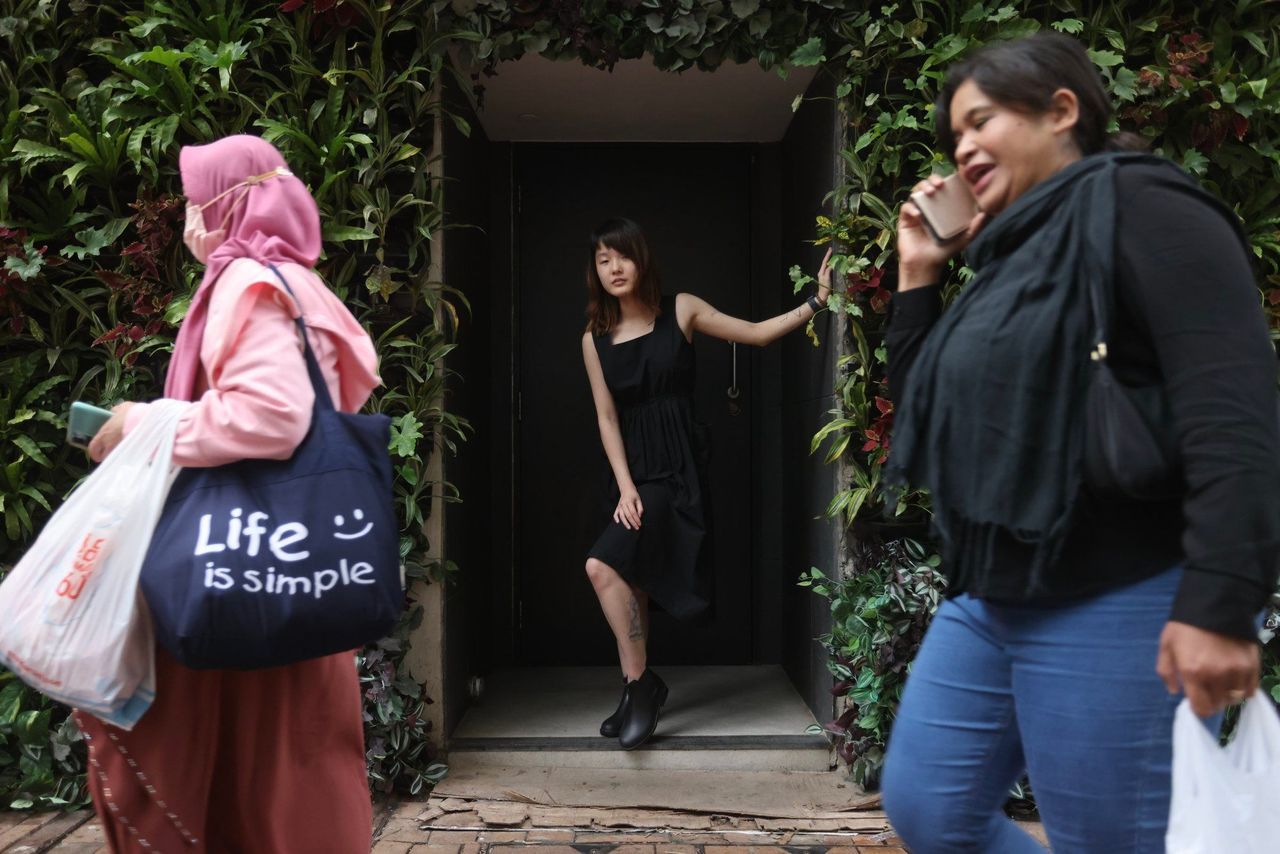Hong Kong News

Risqué business: Hong Kong erotic content creators cash in but dangers lurk
Emilia Wong Yue-kiu was about to start a career in law in 2017 after graduating from university in Hong Kong, but for the past six years has made a comfortable living by putting out nude or scantily clad photos and videos of herself in suggestive poses.
Felicia Szeto started out as a photographic model in 2015, posing for lingerie and nude shots. Since establishing her online account in 2020, she has also been sharing pictures and videos of her sex life to a loyal following.
Both women said they enjoyed exhibitionist photography and that inclination turned profitable yet free from haters thanks to the rise of sites such as OnlyFans and Patreon, which allow content creators to charge viewers for their work.
 “I’m this kind of person who has a desire to perform and present myself sexually,” Emilia Wong says.
“I’m this kind of person who has a desire to perform and present myself sexually,” Emilia Wong says.
The popularity of these paid-for social media platforms has attracted influencers and amateurs alike to sell articles, pictures and videos, including sexual content.
While the two sites did not disclose the number of creators from Hong Kong who offered sexual content, relevant links to OnlyFans or Patreon accounts were seen in other social platforms where they advertised their work. Women are not the only ones selling content on these platforms. Couples and gay men are also on them.
The arrest of an 18-year-old student on suspicion of posting images of a woman stripping off in a public library without authorisation last month sparked speculation as to whether the case was related to the sale of sexual content on paid social media platforms.
 “I cannot deny I derive pleasure and a sense of achievement from the shooting process,” says Felicia Szeto.
“I cannot deny I derive pleasure and a sense of achievement from the shooting process,” says Felicia Szeto.
‘Source of pleasure’
Both Szeto and Wong were upfront in confessing that they liked being admired.
“I have to admit even though there was unwilling sexual contact and requests during private photo sessions, I cannot deny I derive pleasure and a sense of achievement from the shooting process,” Szeto said. “But my joy from being desired does not mean I consent to being touched.”
Over eight years of modelling, Szeto said she had received requests from some photographers to perform sexual acts.
She was also 18 when she took part in her first erotic photo session in 2015 after being approached on Facebook by an amateur photographer in his 30s for a lingerie shoot, for which she was paid HK$300 (US$38) per hour.
Then, in 2018, five sets of her photos and two videos were leaked on an online forum without her consent.
“That was the first time I thought I didn’t want my parents to know what I was doing,” she said.
Szeto did not report it to police, fearing she might be shamed for her erotic photos. But the incident also made her consider selling the photos herself.
She charges US$42 per month for her OnlyFans page, earning between HK$8,000 and HK$30,000. She said her main source of income came from freelance work for non-profit organisations.
Wong began her social media activism in 2014 when she was a law student at Chinese University by posting pictures of herself along with articles where she questioned mainstream beauty standards and how they affected people’s confidence and body image, as well as ideas of how women should not proactively pursue love and sex.
She began writing the commentaries as she reflected on how these ingrained ideas affected her outfit choices and confidence. She posted revealing photos of herself online, believing people were entitled to display their bodies however they wanted as long as no one else was harmed.
She admitted being an exhibitionist, saying: “I’m this kind of person who has a desire to perform and present myself sexually.”
Wong said she found herself enjoying taking risqué photos alone, being both the model and the photographer, which afforded her a rare chance for introspection and to display her body without others’ comments.
By 2017 she was making plans to quit Instagram upon graduating from university, as the online attacks grew tiresome. Viewers would flood the comments section with insults, calling her an “online prostitute”, criticising her curvy figure, asking for sex and even making death threats.
That year, she established her Patreon account to get away from such people.
In 2018, Wong had about 800 subscribers and was earning a monthly income that could reach six figures, but she said the number of people often fluctuated.
Her account has 10 tiers of access, with the cheapest, at HK$10 per month, allowing fans to view less explicit posts.
She charges HK$3,080 for her top tier, which gives fans access to more than 1,600 posts containing videos, photos and articles she has posted over the past two years.
As of April 11, she had 218 patrons paying an average of US$40 per month, or about US$8,300 monthly.
Wong said her friends and family, including her parents, were supportive of her Patreon career. To her, running the account was similar to operating other kinds of online business, where the starting point was often accessible, but success was not guaranteed.
Returning to law is not on the table for Wong, at least for now, with the 28-year-old saying she did not see the legal sector as being more attractive than her Patreon career in terms of salary and satisfaction.
Empowering women?
Lingnan University associate professor of sociology Annie Chan Hau-nung said the trend of individuals creating and selling suggestive photos of themselves online was part of the internet phenomenon allowing practically everything to be commercialised on an individual basis.
“It’s about looking for new videos every time one goes up,” she said. “So demand will grow and content creators think that as long as they continue producing new content, people will keep buying.”
Chan said there were three criteria to determine whether a woman selling sexual content online was empowered to do so: was she doing it as a last resort; did she keep the income or did it go to someone else; and, who else was affected in the process.
But she cautioned that women who sold risqué photos or took part in private erotic photographic or video sessions for payment were particularly underprotected, as such activities could easily be categorised as private transactions.
 Felicia Szeto was 18 when she did her first erotic photo shoot in 2015.
Felicia Szeto was 18 when she did her first erotic photo shoot in 2015.
Jacey Kan Man-ki, senior advocacy officer at the Association Concerning Sexual Violence Against Women, said the sale of private photos on social media had created a significant risk for the women involved as they might not have control over their product.
She said the photographer’s ownership of the copyright to content, and the difficulty of controlling downloads and possible unauthorised redistribution, made it difficult for models and influencers to handle leaks.
“These cases are quite common, where content sold on OnlyFans was discovered subsequently in a Telegram group,” Kan said.
Her organisation offered take-down services for women whose images were leaked. She said that in most cases, websites were cooperative in deleting the content.
If websites refused to delete the content, the association could escalate the matter to website hosting firms.
Demanding removals from Telegram was harder, as her staff could only reach out to administrators of individual channels on the platform.
“These administrators aren’t very responsive. They often respond rudely to victims, and I have heard of cases where they were unwilling to take down the content,” she said.
Kan also noted victims were reluctant to contact the authorities over such leaks for fear of being judged.
There was also the possibility of legal consequences if their content was classified as obscene or indecent materials.
Legal pitfalls
Barrister Albert Wan Chun-yau, who adjudicates on the Obscene Articles Tribunal, said influencers and models who sold sexual content on social media were equally regulated as physical publishers under the Control of Obscene and Indecent Articles Ordinance.
Offenders are liable to three years’ jail and a fine of HK$1,000,000 for publishing articles categorised as obscene, while publishing indecent articles to juveniles could result in imprisonment of up to 12 months and a HK$400,000 fine.
He said OnlyFans creators, or private photographic models who did not own the copyright of the images, might risk offending the law if the content was leaked online.
In case of a leak, Wan said, the creators or the models could make a report to police but they themselves risked being prosecuted for breaching the ban or restrictions on the publication of obscene or indecent articles under the ordinance.
Solicitor Eric Chan Pak-ho said police were unlikely to prosecute models as the evidence-gathering process might be too time-consuming given the offence was relatively minor.
Law graduate Wong admitted there were legal concerns to running her Patreon account and said she acted accordingly to the law.
Asked whether she would continue to run her account in the long term, Wong was open to the idea, but emphasised that passion came first.
“Yes, why not? [However] if I lose interest in it one day, I will stop,” she said.











